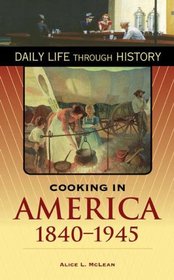Search -
Cooking in America, 1840-1945 (The Greenwood Press Daily Life Through History Series)
Cooking in America 18401945 - The Greenwood Press Daily Life Through History Series
Author:
This cookbook covers the years 1840 through 1945, a time during which American cookery underwent a full-scale revolution. Gas and electric stoves replaced hearth cookery. Milk products came from commercial dairy farms rather than the family cow. Daily meals were no longer bound by seasons and regions, as canned, bottled, and eventually frozen pr... more »
Author:
This cookbook covers the years 1840 through 1945, a time during which American cookery underwent a full-scale revolution. Gas and electric stoves replaced hearth cookery. Milk products came from commercial dairy farms rather than the family cow. Daily meals were no longer bound by seasons and regions, as canned, bottled, and eventually frozen pr... more »
ISBN-13: 9780313335747
ISBN-10: 0313335745
Publication Date: 8/30/2006
Pages: 232
Edition: 1
Rating: ?
ISBN-10: 0313335745
Publication Date: 8/30/2006
Pages: 232
Edition: 1
Rating: ?
0 stars, based on 0 rating




